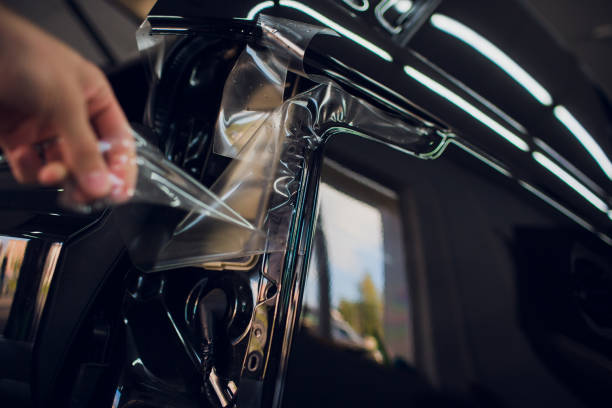Understanding the UK window tint laws in 2024 is essential for vehicle owners and enthusiasts who want to modify their cars while staying within legal boundaries. This article will cover the key aspects of these laws, including regulations on mirror tints, permissible tint levels, and the consequences of non-compliance.
Legal Tint Limits in the UK
In the UK, window tint laws are primarily concerned with ensuring that drivers have a clear view of the road, both day and night. The legal tint limits vary depending on which windows are being tinted:
- Front Windshield: The law requires that the front windshield allows at least 75% of light through. This ensures that the driver has an unobstructed view, crucial for safety.
- Front Side Windows: These windows must let in at least 70% of light. This regulation helps maintain visibility and eye contact with other road users, including pedestrians and cyclists.
- Rear Windows and Rear Windshield: The law is more lenient for the rear windows and rear windshield. There are no specific light transmission requirements, allowing for darker tints or even privacy glass, provided the vehicle is equipped with dual side mirrors.
Mirror Tints and Their Restrictions
Mirror tints, which create a reflective or mirrored effect, are popular for their stylish appearance and additional privacy. However, they are subject to strict regulations in the UK. The primary concern with mirror tints is their potential to cause glare and reflections, which can distract other drivers.
The UK window tint law generally prohibits the use of mirror tints on the front windshield and front side windows due to these safety concerns. For the rear windows and rear windshield, mirror tints are allowed, but it is advisable to check with local authorities or professional tinting services to ensure compliance with any additional regulations that may apply.
Enforcement and Penalties
Non-compliance with UK window tint laws can result in several penalties. If your car’s windows are found to be illegally tinted, you might face:
- Fixed Penalty Notice: You could receive an on-the-spot fine if your windows are deemed too dark.
- Prohibition Notice: This requires you to rectify the tint issue before the vehicle can be legally driven again.
- Court Summons: In severe cases, non-compliance can lead to a court appearance, which may result in a more substantial fine and points on your driving license.
Law enforcement officers use devices called light meters to measure the level of light transmission through your windows. If your tints are suspected of being too dark, they will use these devices to determine compliance.
Choosing a Reputable Tinting Service
To ensure your vehicle meets UK window tint law requirements, it’s crucial to choose a reputable tinting service. Professional services will be familiar with current regulations and can advise you on permissible tint levels. They will also provide certification that your tint complies with the law, which can be useful if you are stopped by police.
Staying Informed
Laws and regulations can change, so staying informed about current UK window tint laws is vital for vehicle owners. Regularly check for updates from official sources such as the UK government or the Driver and Vehicle Standards Agency (DVSA).
By understanding and adhering to the UK window tint laws in 2024, you can enjoy the benefits of tinted windows while avoiding legal issues and ensuring road safety.
